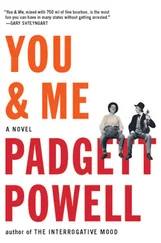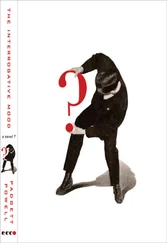“Of course I quit my job,” Mr. Irony said, worried that the woman had somehow detected his enjoyment in the irony of her quitting Toys “R” Us and his quitting irony.
“Child,” she said, “you can’ quit. You got to be fire. You quit, but you git them to fire your ass. You quit in your heart, but you git fire on paper.”
“Maybe I was fired,” Mr. Irony said.
“If you was, you know.”
“Actually, I never really had a job, I had a—”
“Honey, none us ever had no job. Who want that?”
“I had a … style, you might say.”
The woman looked at him with a grin. “You was some kind pimp, I bet. I like them miscegenational pimps—”
“No, madam, it’s—”
“Hell. Don’ get snitty.”
It was going to be a hard life, Mr. Irony saw. Without something to fill the void left by the departure of his vice, he was going to be subject to humorless days until he got high on something else. Christ was out of the question, precisely because He Himself contained no small measure of irony. Even getting high on “life itself” sounded inappropriately ironic. Only being a … circus rider made, at the moment, any kind of clean, unironical sense.
There would be no irony in standing on a horse, if you could. And if the horse moved in a circle, that was its business. And if you had to put on some tights and a sequined vest and some special slippers, and the horse had to wear some flashy, colorful hardware, that was show business. He did not see how a man who had renounced irony could go wrong being a circus rider.
He began trying to fill in Desired Vocation on his forms against his thigh. The woman behind him bent over also to see what he was writing.
“Circus rider. That’s a good one,” she said. “You catchin on. You never get hire.”
Even though there was a rich incense of irony about this woman and everything she said, Mr. Irony liked her. He looked at her fondly and she got down on her hands and knees.
“This the best part of Unemployment, honey. Put them foams on my back and write all you wont to. It feels good. Don’t poke too hard or you’ll come through.”
Mr. Irony did as he was told, and used the human desk as it and he moved incrementally toward their benefits.
Back at his apartment, Mr. Irony had a seizure, or something like a seizure. It was probably equivalent to the withdrawal anxiety common to boozers or druggers, only his fear was uncharted: he was sailing for the first time in the troubled, mundane waters of life without irony. It made him stand glumly beside the refrigerator, knowing that opening it and bending and looking at all the things — cruddy-lipped mustard jars, two olives in a tall bottle, a Baggie full of rotten parsley, a small German roach moving very slowly — that used to delight him in their queer combinations was not a pleasure open to him now. As a young man he had lost his women and lost his mind; as an older man he had lost money and his mind; now he had lost his irony, and it had never been this bad. Women and money were nothing to irony.
At the Unemployment Office he had been denied benefits because he had had no employer. His case worker finally did not doubt that he might have been fired after reading his aptitude questionnaire (under skills, Mr. Irony listed “left-handed”). When the issue of self-employment was broached, Mr. Irony denied stringently that he had been his own employer, a flatly ironic notion and one therefore not available to a reformed ironic. The entire affair — two days and six hours and forty-eight minutes from taking a number to being dismissed as ineligible for benefits — which once would have made his day, or week, was as disappointing as it would have been to the common fools down there trying to get something for nothing. He realized, finally, standing by the refrigerator, just before he opened it and ate the two olives and scared the roach and squeezed a green juice from the parsley Baggie, that being down there had been off limits; what was more ironic than getting paid for not working only if you could prove someone had deemed you unsuitable for working? Why couldn’t you be paid for not working if you were suitable? Only the unfit benefit. It was not Darwinian. It was ironic. It had been, he saw now, a close call, close to a “slip” in the parlance of reforming abusers of substance and, he supposed it was fair to regard himself, abusers of style. He was a reforming abuser of style, a reforming ironic.
There were no books for him, no post-or pre-traumatic stress syndromes, no Adult Children of Ironic Parents groups to go to, no women counselors that spent their lives holding your hand if you’d had too much fun abusing something and now wanted as recompense to hold hands with idle women. No nothing. He was alone. He might have been on Mars. This gave him comfort. At least he was not in a herd of whiners who pulled out a poker chip and explained its significance before they told you their name. Mr. Irony resolved he would carry a cow chip before a poker chip, if that was not ironic — already, he was relieved to discover, he was not sure what irony was. A positive sign.
Still, he was pretty certain that extracting from the pocket in a somber, proud, ceremonious fashion and confidentially beginning to explain to an innocent bystander that what this cow chip represented was … was ironic. Perhaps he could, for a while, find a substitute for irony. Substitute therapy was common, even if it itself was perhaps a little ironic.
He had recently witnessed a father and young daughter purchasing some candy for the mother’s birthday. The child, who was allowed to select the candy, decided on chocolate-covered peanuts, and decided that they were “pretend poops.” Indeed, the candies had looked like small, hard turds.
“But don’t tell Mommy we’re giving her pretend poops,” the father instructed.
The child grinned wickedly. “It’ll be … pretty surprisy !”
That, Mr. Irony thought, might be an acceptable substitute for ironic: surprisy. Irony he could quit, but, as methadone to his heroin, he could not quit that which was surprisy.
“Surprisy it is, then,” he announced, still leaning against the refrigerator, immediately looking less glum. He then crawled out of his own kitchen window and crawled back in. It felt good. He felt fine. Not himself, but all right.
“All surprising right,” he said, beginning a rubber-legged dance that came to him. He bandied this way through the apartment, saying “Surprise you!” to walls and paintings and furnishings. He told everything to surprise off. “Just get the surprise out of my way,” he said to a pair of boxer shorts, and deftly toed them — through an incredibly long arc — into the clothes hamper. Suddenly, badly, he wanted a uniformed maid working full time in his small apartment, altogether too small for such a servant, and he wanted only new clothes.
Piling all of his old clothes into a heap, and thinking of how he might safely present himself at the haberdasher’s naked, he paused to congratulate himself: not just any man could kick irony once it had its teeth in him. A lesser man, one less surprisy, would have failed.
MARIO MOSCALINI PASSED ON his way out the door every morning one of several Michelin guides to Italy that were kept open to his favorite passage about modern Italy. He sometimes glanced at the books, but he had long before memorized the passage:
Modern Italy. — In this land abounding in every type of beauty, the modern Italian lives and moves with perfect ease. Dark-haired, black-eyed, gesticulating, nimble and passionate, he is all movement and fantasy .
Читать дальше












